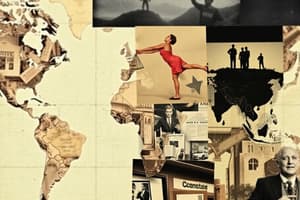Podcast
Questions and Answers
What factors are commonly associated with poverty aside from crime?
What factors are commonly associated with poverty aside from crime?
- Lack of employment and health services (correct)
- Access to quality education
- High disposable income
- Strong community ties
What does the author suggest is often misinterpreted in discussions about crime?
What does the author suggest is often misinterpreted in discussions about crime?
- Criminal behavior is always a personal choice (correct)
- Poor neighborhoods inherently produce criminals
- Poverty is a consequence of crime
- Crime primarily occurs in wealthy areas
According to the discussion, what is crucial to address when considering the relationship between crime and poverty?
According to the discussion, what is crucial to address when considering the relationship between crime and poverty?
- The economic conditions leading to crime (correct)
- The effectiveness of law enforcement
- The stereotypes associated with crime
- The personal histories of criminals
What assumption is challenged regarding the causes of crime?
What assumption is challenged regarding the causes of crime?
What is indicated as a common misconception about crime and poverty?
What is indicated as a common misconception about crime and poverty?
How does the text describe the relationship between criminal acts and poverty?
How does the text describe the relationship between criminal acts and poverty?
What is emphasized as a necessary focus in addressing crime?
What is emphasized as a necessary focus in addressing crime?
What is noted about the public perception of areas with high crime rates?
What is noted about the public perception of areas with high crime rates?
What is suggested about the relationship between the poor underclass and the upper class?
What is suggested about the relationship between the poor underclass and the upper class?
What role does unearned privilege play in the accumulation of wealth?
What role does unearned privilege play in the accumulation of wealth?
What is the effect of inheritance on wealth distribution?
What is the effect of inheritance on wealth distribution?
What does the term 'economic inequality' refer to in the context provided?
What does the term 'economic inequality' refer to in the context provided?
What is implied about the justice system's relationship with poverty?
What is implied about the justice system's relationship with poverty?
What does Piketty’s study indicate about the future of wealth accumulation?
What does Piketty’s study indicate about the future of wealth accumulation?
Which statement best reflects the critique of poverty in the context provided?
Which statement best reflects the critique of poverty in the context provided?
What is a consequence of the economic system as described in the text?
What is a consequence of the economic system as described in the text?
What is implied about the effectiveness of police in addressing social issues like housing and mental health?
What is implied about the effectiveness of police in addressing social issues like housing and mental health?
What differentiates shoplifting from mis-stating income or taxes in the legal framework?
What differentiates shoplifting from mis-stating income or taxes in the legal framework?
Which of the following reasons is given for why the legal system may seem to preserve the status quo?
Which of the following reasons is given for why the legal system may seem to preserve the status quo?
What is the tone of the statement regarding the intentions of individuals in policing and law?
What is the tone of the statement regarding the intentions of individuals in policing and law?
How does the discussion characterize economic crimes as opposed to street crimes?
How does the discussion characterize economic crimes as opposed to street crimes?
What overarching question does the text raise concerning laws related to poverty?
What overarching question does the text raise concerning laws related to poverty?
What might be a consequence of the legal system’s focus on maintaining the status quo?
What might be a consequence of the legal system’s focus on maintaining the status quo?
Which statement accurately reflects the view on the role of police in relation to corporate crime?
Which statement accurately reflects the view on the role of police in relation to corporate crime?
What is suggested about the location of panhandling, homelessness, and petty theft?
What is suggested about the location of panhandling, homelessness, and petty theft?
How does the legal system typically address issues of crime?
How does the legal system typically address issues of crime?
What is a major challenge in addressing crime as a social problem?
What is a major challenge in addressing crime as a social problem?
What aspect of society does the criminal justice system struggle to address effectively?
What aspect of society does the criminal justice system struggle to address effectively?
According to the content, the criminal justice system serves mainly as what type of mechanism?
According to the content, the criminal justice system serves mainly as what type of mechanism?
What is implied about crime committed by wealthy individuals?
What is implied about crime committed by wealthy individuals?
What group is identified as being increasingly pressured by wealth inequality?
What group is identified as being increasingly pressured by wealth inequality?
Which role does the criminal justice system primarily play in society according to the content?
Which role does the criminal justice system primarily play in society according to the content?
What is suggested as the ultimate purpose of policing and lawyering?
What is suggested as the ultimate purpose of policing and lawyering?
How do policing and lawyering contribute to social issues according to the content?
How do policing and lawyering contribute to social issues according to the content?
Which scenario describes a temporary solution provided by policing?
Which scenario describes a temporary solution provided by policing?
What is a critique of the legal profession as presented in the content?
What is a critique of the legal profession as presented in the content?
According to the discussion, what tools are mentioned as ineffective in addressing systemic issues?
According to the discussion, what tools are mentioned as ineffective in addressing systemic issues?
What uncomfortable conclusion is drawn about crime in relation to societal structures?
What uncomfortable conclusion is drawn about crime in relation to societal structures?
What misconception about the practices of policing is addressed in the content?
What misconception about the practices of policing is addressed in the content?
How are policing and lawyering described in terms of their impact on social structural problems?
How are policing and lawyering described in terms of their impact on social structural problems?
What is identified as a primary factor contributing to shoplifting?
What is identified as a primary factor contributing to shoplifting?
What historical event is mentioned as an example of urban fire destruction?
What historical event is mentioned as an example of urban fire destruction?
What approach is suggested to prevent social problems rather than relying solely on police services?
What approach is suggested to prevent social problems rather than relying solely on police services?
Which analogy is used to explain the ineffectiveness of the criminal justice system in addressing poverty?
Which analogy is used to explain the ineffectiveness of the criminal justice system in addressing poverty?
What essential regulations are suggested as necessary for fire prevention?
What essential regulations are suggested as necessary for fire prevention?
What question is posed regarding the purpose of the criminal justice system?
What question is posed regarding the purpose of the criminal justice system?
What is NOT a method suggested for addressing fire-related issues?
What is NOT a method suggested for addressing fire-related issues?
What does the term 'fire of poverty and social inequality' metaphorically suggest?
What does the term 'fire of poverty and social inequality' metaphorically suggest?
Flashcards
Poverty and Crime Correlation
Poverty and Crime Correlation
A common misconception links poverty with crime, often assuming that criminal activity stems from socioeconomic disadvantages.
Poverty's Broader Impact
Poverty's Broader Impact
Poverty encompasses more than just a lack of money; it includes lack of employment, education, housing, food security, health services, and financial stability.
Societal Economic Conditions and Crime
Societal Economic Conditions and Crime
Economic conditions, rather than individual choices, are the primary drivers of criminal activity within a society.
Individual Choices vs. Socioeconomic Factors
Individual Choices vs. Socioeconomic Factors
Signup and view all the flashcards
Deviant Behaviors and Crime
Deviant Behaviors and Crime
Signup and view all the flashcards
Poverty vs. Crime: Co-creation
Poverty vs. Crime: Co-creation
Signup and view all the flashcards
Economic Conditions as the Root Cause
Economic Conditions as the Root Cause
Signup and view all the flashcards
Individual Blame vs. Systemic Issues
Individual Blame vs. Systemic Issues
Signup and view all the flashcards
Crime and Marginalization
Crime and Marginalization
Signup and view all the flashcards
Structural Problems
Structural Problems
Signup and view all the flashcards
Individualized vs. Structural
Individualized vs. Structural
Signup and view all the flashcards
Wealth Inequality
Wealth Inequality
Signup and view all the flashcards
Systemic Inequality
Systemic Inequality
Signup and view all the flashcards
Criminal Justice System's Role
Criminal Justice System's Role
Signup and view all the flashcards
Limited System Capacity
Limited System Capacity
Signup and view all the flashcards
Marginalization's Perpetuation
Marginalization's Perpetuation
Signup and view all the flashcards
Unearned Privilege
Unearned Privilege
Signup and view all the flashcards
Wealth Consolidation
Wealth Consolidation
Signup and view all the flashcards
Inherited Wealth
Inherited Wealth
Signup and view all the flashcards
Economic Inequality
Economic Inequality
Signup and view all the flashcards
Poverty as a Function of the System
Poverty as a Function of the System
Signup and view all the flashcards
Criminalization of Poverty
Criminalization of Poverty
Signup and view all the flashcards
Wealth Redistribution
Wealth Redistribution
Signup and view all the flashcards
Justice of the Justice System
Justice of the Justice System
Signup and view all the flashcards
Police Role in Societal Issues
Police Role in Societal Issues
Signup and view all the flashcards
Poverty and Crime Relationship
Poverty and Crime Relationship
Signup and view all the flashcards
Economic Crimes as Administrative Issues
Economic Crimes as Administrative Issues
Signup and view all the flashcards
Legal System's Primary Function
Legal System's Primary Function
Signup and view all the flashcards
Legal System's Role in Inequality
Legal System's Role in Inequality
Signup and view all the flashcards
Good Intentions and Systemic Issues
Good Intentions and Systemic Issues
Signup and view all the flashcards
Status Quo and Law & Order
Status Quo and Law & Order
Signup and view all the flashcards
Social Change & Policing/Lawyering
Social Change & Policing/Lawyering
Signup and view all the flashcards
Purpose of Policing & Lawyering
Purpose of Policing & Lawyering
Signup and view all the flashcards
Inequality & Systemic Change
Inequality & Systemic Change
Signup and view all the flashcards
Are Police & Lawyers Effective?
Are Police & Lawyers Effective?
Signup and view all the flashcards
Tools & Systemic Inequality
Tools & Systemic Inequality
Signup and view all the flashcards
Crime & Inequality: Correlation
Crime & Inequality: Correlation
Signup and view all the flashcards
Policing: Temporary Alleviation
Policing: Temporary Alleviation
Signup and view all the flashcards
Lawyering: Fairness or Maintenance?
Lawyering: Fairness or Maintenance?
Signup and view all the flashcards
Is the police service the right solution for shoplifting?
Is the police service the right solution for shoplifting?
Signup and view all the flashcards
What's a better approach to preventing fires?
What's a better approach to preventing fires?
Signup and view all the flashcards
What's the analogy for poverty and inequality?
What's the analogy for poverty and inequality?
Signup and view all the flashcards
Can the criminal justice system solve poverty?
Can the criminal justice system solve poverty?
Signup and view all the flashcards
What's the purpose of the criminal justice system?
What's the purpose of the criminal justice system?
Signup and view all the flashcards
What does the fire analogy imply?
What does the fire analogy imply?
Signup and view all the flashcards
Are individual choices the primary driver of crime?
Are individual choices the primary driver of crime?
Signup and view all the flashcards
What does the passage suggest about addressing crime?
What does the passage suggest about addressing crime?
Signup and view all the flashcards
Study Notes
Poverty and Crime
- Poverty is often linked to crime, with areas of low socioeconomic status often associated with higher crime rates.
- Poverty encompasses more than just lack of money, also including lack of employment, education, housing, food security, health services, and financial stability.
- Societal-level economic conditions determine engagement with crime, not the consequences of poverty itself.
Economic Conditions and Crime
- Individual choices are often viewed as a root cause of crime, but poverty and inequality are not choices.
- Economic conditions significantly influence crime and deviancy.
- The criminal justice system is often designed to address symptoms, not underlying causes.
Inequality and Crime
- Inequality, like poverty, is not chosen, impacting behaviour and potentially leading to criminal activity that is then blamed on the individual
- Social inequality is deeply connected to criminal behaviour within a broader system of laws and opportunity.
- The legal structure often perpetuates existing power imbalances and inequalities.
Inequality in Legal System
- The legal system frequently reflects the interests of the wealthy, disproportionately impacting the poor.
- Legal systems often prioritize individual responsibility for crime over addressing systemic causes of inequality.
- Criminalization of poverty-related actions overlooks the economic pressures driving the situations.
Poverty and Criminalization
- Policing often targets poor communities, reinforcing existing inequalities and marginalization.
- Police responses reflect systemic social problems, not effective solutions
- The current legal and criminal justice system is often inadequate for dealing with complex social issues.
Studying That Suits You
Use AI to generate personalized quizzes and flashcards to suit your learning preferences.




